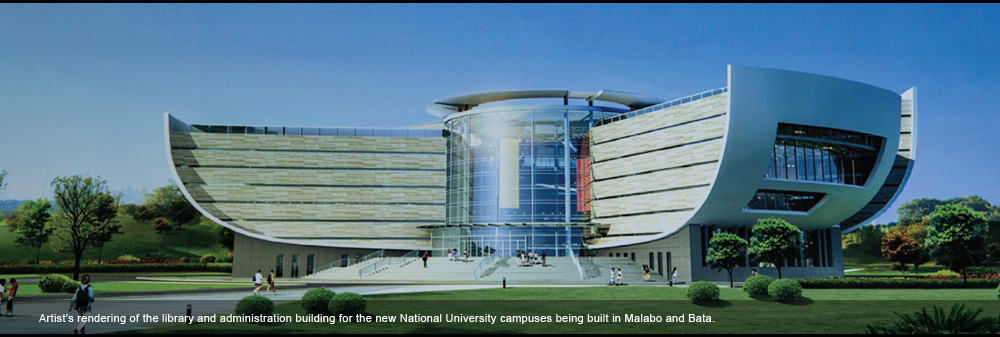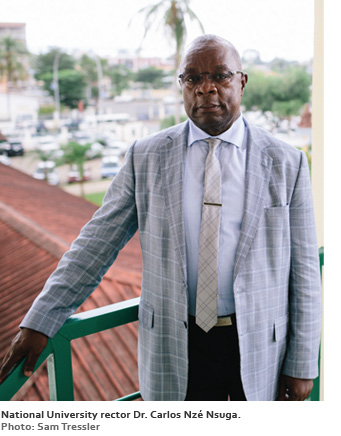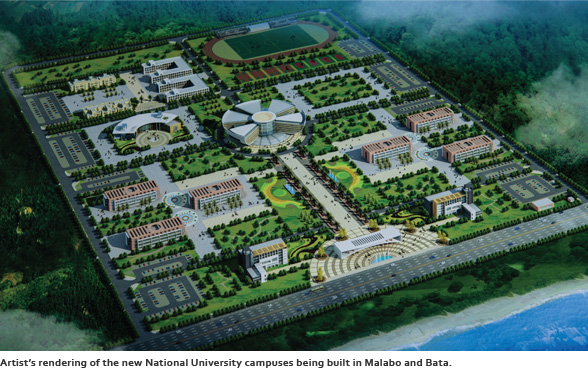

The university is the first in Equatorial Guinea. Colonial Spain never established a university in the country, so very few of the native population ever acquired a university degree, and then only through study abroad. The highest level of education provided under Spanish rule was through a school teaching public administration in Malabo. When the economy started to develop strongly after the discovery of oil in the mid-1990s, the need for a well-educated population to man a rapidly modernizing country became pressing. Founded in 1995, the National University began with a mere 200 students. Today some 9,000 students study at each of the two campuses in Malabo and Bata, campuses that are now overcrowded. The story of this phenomenal growth in just 20 years is testimony to the dedication of its teaching staff and administrators, according to Dr. Nzé Nsuga. It takes time to build a good educational institution, especially in a country that has never had one and lacks a pool of well-trained educators. UNGE has addressed this problem through hiring teaching staff from other countries while building up its own resources. It has also aggressively pursued partnerships with universities in Africa, Europe and the Americas, thereby enriching its educational programs. The rapid expansion of education in the country has also been greatly facilitated by the government providing schooling free of charge through all school grades and at UNGE. The soft–spoken rector, during a lengthy interview in his office, outlined the development of how the National University came to be what it is today and noted some of the new educational projects for Equatoguineans. Historical Perspective Prior to the establishment of UNGE, Equatorial Guinea had only one higher education program – a distance learning center run from Spain – designed primarily for training teachers. Students interested in other fields had to go abroad, many under scholarship programs from Spain, the Soviet Union, Cuba and other countries. The earliest professors for UNGE were many of those educated abroad who returned once the new government of President Obiang Nguema Mbasogo came to power in 1979. “We started with just three schools here in Malabo: a school of fishing and forestry management, a school of education, and a school of admin- Artist’s rendering of the new National University campuses being built in Malabo and Bata. istration,” Dr. Nzé Nsuga said. “Bata also began with three schools: teacher training, engineering, and health.” Over the years, the university expanded its departments to include a school of liberal arts and social sciences with programs in law, languages, and communication. In Bata, courses were offered in the natural sciences and medicine.
A Popular Partnership with Drexel University These activities are supported by a research center in Moka, high in the rain-drenched tropical forests at the south of the island, and with instruction by teaching staff from both Drexel and UNGE. Drexel students also get Spanish language classes. Another UNGE collaboration with an American university is for Equatoguinean engineering students to study at the University of South Carolina. An American University in Oyala The new university is planned for 8000 students. It will include schools of medicine, architecture, civil and petroleum engineering, law, and business. In discussing all these developments, Dr. Nzé Nsuga displays an obvious sense of pride in how far UNGE and his country have come since he was a student. He noted that for his first job he used to run to work, and that even ministers of government did not have cars. Of the rapid expansion of higher education in Equatorial Guinea, he says it is “a true legacy my generation never experienced.” |
MALABO GUIDE
|
East West Communications ©


